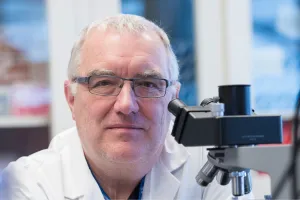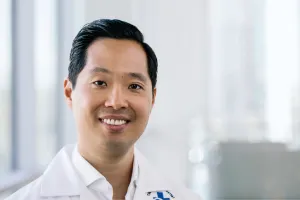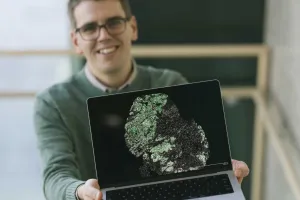Rock star researcher uses big data to answer big questions
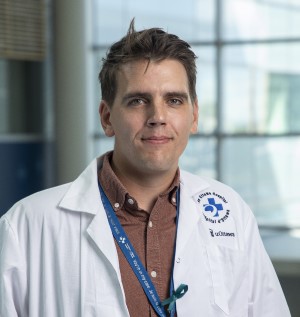 "As a researcher, your job is to ask questions that nobody has the answer to. There are moments when you're the only person in the world to know something, and that's an incredible feeling." - David CookGrowing up, David Cook knew he was going to be a rock star. Little did he know it would be as a researcher answering big questions with big data.
"As a researcher, your job is to ask questions that nobody has the answer to. There are moments when you're the only person in the world to know something, and that's an incredible feeling." - David CookGrowing up, David Cook knew he was going to be a rock star. Little did he know it would be as a researcher answering big questions with big data.
"When I was a kid, my obsession was music, and that was going to be my career," said Cook. "I didn't take the academic courses needed to get into university. But when my band didn't become famous, I needed to find an alternative."
He worked as an audio engineer at an Ottawa recording studio for a few years, where he also taught youth music camps. In time Cook decided to try nursing, and attended adult high school so he could get into university.
During undergrad at the University of Ottawa, Cook fell in love with science. He was fascinated by a talk given by Dr. Barbara Vanderhyden on reproductive physiology. After the lecture, he asked how he could learn more. She suggested he do an honours research project in her lab at The Ottawa Hospital studying ovarian cancer. Cook went on to do both a masters and PhD in her lab.
"Since the moment I walked into the lab, I've never looked back," said David. "As a researcher, your job is to ask questions that nobody has the answer to. There are moments when you're the only person in the world to know something, and that's an incredible feeling."
For his masters, Cook studied how stem cells make decisions to stay stem cells or become other cells. His PhD focuses on how cancer cells make decisions to hide from the immune system and from cancer immunotherapies. He has been exceptionally productive, publishing 16 manuscripts in the past three years.
During his masters, Cook discovered computational biology, which uses data collected during experiments to build computer models of biological systems.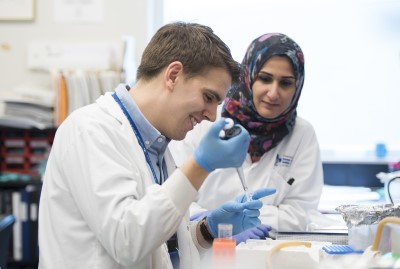
"It was another tool in my research toolkit. When you have more tools, you can ask new questions," said David.
No-one in his lab had used these methods before, so Cook set out to teach himself. "Maybe it was the millennial in me - I figured the internet had the answer."
He started with one dataset sitting on the lab's hard drive, and it worked. During his masters and PhD, Cook continued learning and applying computational biology methods to his projects. He became the institutional expert on these techniques, and researchers from across the hospital sought him out as an instructor and collaborator.
"David pioneered the use of these methods at The Ottawa Hospital," said Dr. Vanderhyden. "He fearlessly centered his masters and PhD around this type of data, and has been very active in sharing his expertise with the hospital and university community."
Cook also developed a new computational method for single cell RNA sequencing, a tool used to determine which genes are being turned on and off in a single cell. He found a way to run 960 samples for the cost of ten. While others had proposed the technique before, his paper in Nature Communications was the first to apply it at this scale. The paper was also ground-breaking in understanding different subtypes of ovarian cancer cells, with implications for treatment.
During the COVID-19 pandemic, Cook gave two seven-hour webinars on analyzing single cell RNA sequencing data to well over a hundred researchers.
"I get a lot of joy in helping researchers understand how to use computational biology tools. Many people shy away because they didn't take any computer science or math in university. Hopefully I can be an inspiration-- I didn't take any of those courses!"
Cook has also shared his love of science with the public through school classroom activities with Let's Talk Science and lab tours with The Ottawa Hospital Foundation.
As for his music career? For the past decade, Cook has been involved in an artist development program and has mentored hundreds of teen musicians.
The Ottawa Hospital is a leading academic health, research and learning hospital proudly affiliated with the University of Ottawa. Research at The Ottawa Hospital is possible because of generous donations to The Ottawa Hospital Foundation.
Media Contact
Amelia Buchanan
Senior Communication Specialist
Ottawa Hospital Research Institute
Cell: 613-297-8315
ambuchanan@ohri.ca
Learn more about:
The Ottawa Hospital is a leading academic health, research and learning hospital proudly affiliated with the University of Ottawa and supported by The Ottawa Hospital Foundation.
